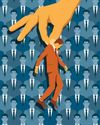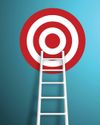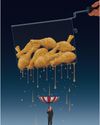
There has been a seismic shift in how people view work - how they work, where they work and with whom they work. No longer built around the idea of a 9-5 job, the future of work is becoming much more fluid, allowing people's creativity, passion and skill sets to shine. As this evolution continues, the creator economy and the ethos creators personify will pave the way for the future of work.
In many ways, the future of work is already here. The creator economy is estimated to hit over $104 billion by the end of 2022. More than 50 million people consider themselves creators, and roughly 30% of American youth want to become digital creators instead of traditional occupations such as doctors and lawyers. But being a creator doesn't just mean using social media or monetizing online content. Being a creator means doing work that you're deeply passionate about - which often means sharing experiences, expertise or creativity with an audience. That audience can be millions of subscribers on YouTube or a few dozen clients on Kajabi. That's the beauty of the creator ethos: No matter what you have to share, there will be an audience eager to consume it.
Embracing a strong sense of self
At the heart of the creator ethos is a strong sense of self. Rather than being "one of many," or working for one company or marketplace, being a creator means being able to thrive on your own terms. In fact, this strong sense of self is one. of the biggest differences between gig workers and creators.
Esta historia es de la edición Startups January 2023 de Entrepreneur magazine.
Comience su prueba gratuita de Magzter GOLD de 7 días para acceder a miles de historias premium seleccionadas y a más de 9,000 revistas y periódicos.
Ya eres suscriptor ? Conectar
Esta historia es de la edición Startups January 2023 de Entrepreneur magazine.
Comience su prueba gratuita de Magzter GOLD de 7 días para acceder a miles de historias premium seleccionadas y a más de 9,000 revistas y periódicos.
Ya eres suscriptor? Conectar

Chords of Success
For Saahil Goel, the deep-rooted passion for playing the guitar dates back to his high school days. Influenced by legends like Pink Floyd, Led Zeppelin, and the Pakistani band Strings, his musical journey mirrors his leadership style-balancing focus, discipline, and a collaborative spirit. Goel feels that playing guitar has enhanced his ability to balance focus and teamwork as a founder of an eCommerce shipping start-up.

IS YOUR RENT TOO DAMN HIGH?
Many small business owners struggle with their rents. Here's what to do.

HOW TO BOUNCE BACK FROM A BAD REVIEW
A one-star review can hurt your ego - and your business. But it's possible to prevent (and remedy!) this scary scenario.

HOW TO HIRE FOR THE FUTURE
Small businesses are struggling to find quality labor. So flip the conversation: Show workers how your business will set them up for opportunity.

You Can Hire Like Netflix
The streaming platform built an incredible team with a strategy called “talent density.” But you don’t need to be a tech giant to do it.

Speedy Growth Killed My Startup
We seemed to be rocking it - lots of press, major partnerships. Then we learned the harsh consequences of overlooking our customers.

Three Pivots to $100 Million
How do you find a working business model? Do it like Rowan-a brand that reinvented itself many times before finally piercing the ear-piercing market.

What Goals Actually Matter?
Some benchmarks are more important than others so what should you really care about? We asked six founders for their hardest-won lessons.

'Only the Strongest Are Going to Survive'
Brian Lee cofounded companies like LegalZoom and ShoeDazzle-and he believes a lot of conventional business wisdom is backward. Sure, it's harder to raise capital. But it's actually cheaper than ever to start a company.

HOW TRUST SAVED KFC
The former CEO of Yum! Brands explains how he turned around a struggling KFC-and the important lesson it offers for anyone in franchising.